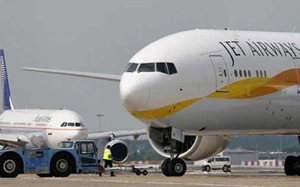 New Delhi, Jun 15: The Rs.2058 crore deal struck by Jet Airways to sell 24 per cent of its stake to Abu Dhabi's Etihad Airways was put on hold on Friday by Government's foreign investment approving agency which sought more clarity on control and ownership of the Indian airline.
New Delhi, Jun 15: The Rs.2058 crore deal struck by Jet Airways to sell 24 per cent of its stake to Abu Dhabi's Etihad Airways was put on hold on Friday by Government's foreign investment approving agency which sought more clarity on control and ownership of the Indian airline.
"It (Jet-Etihad proposal) has been deferred. We need more details on effective control and ownership," Economic Affairs Secretary Arvind Mayaram, who heads the Foreign Investment Promotion Board (FIPB)," told reporters after a meeting here.
Market regulator SEBI and competition watchdog CCI have already sought clarifications from the premier private carrier on the transaction, to ensure that Etihad's ownership powers in Jet remains in line with its 24 per cent stake in the company's equity capital.
Asked about the development, Civil Aviation Minister Ajit Singh said SEBI has raised some concerns and asked both the airlines to "rectify some parts of the pact."
"I don't see any major problem for the deal," Singh said.
When contacted, Jet sources said they have already submitted the necessary clarifications to SEBI.
It could not be ascertained when the FIPB would take up the Jet-Etihad proposal next. Once the FIPB clears it, the matter would be sent to the Cabinet Committee on Economic Affairs for approval. All deals over Rs 1,200 crore have to be approved by CCEA.
Shares of Jet Airways closed at Rs 469.20, up 8.47 per cent on the BSE, ahead of the FIPB meet.
The deal is the largest foreign investment proposal in the aviation sector after the government allowed foreign carriers to pick up stake in Indian airlines last September.
In March, the FIPB had cleared Rs 81 crore investment proposal of AirAsia to set up a JV airline company, AirAsia India, with Tata Sons and another partner.





Comments
Add new comment